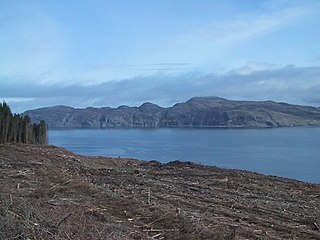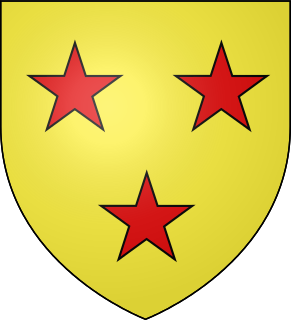See also
| This disambiguation page lists articles about people with the same name. If an internal link led you here, you may wish to change the link to point directly to the intended article. |
Angus MacLeod may refer to:
Angus MacLeod was a farmer and political figure on Prince Edward Island. He represented 4th Kings in the Legislative Assembly of Prince Edward Island from 1886 to 1893 as a Liberal.
Admiral Angus MacLeod CVO was a Royal Navy officer who became Senior Officer, Coast of Ireland Station.
Angus Macleod was a British journalist and editor from Scotland. He was born in Stornoway on Lewis in 1951, the son of a Harris Tweed mill worker. After studying at The University of Edinburgh he worked for The Scotsman newspaper. During his career he worked at the Sunday Mail, Scottish Daily Express, and latterly as Scottish editor of The Times.
| This disambiguation page lists articles about people with the same name. If an internal link led you here, you may wish to change the link to point directly to the intended article. |

Clan MacLeod is a Highland Scottish clan associated with the Isle of Skye. There are two main branches of the clan: the MacLeods of Harris and Dunvegan, whose chief is MacLeod of MacLeod, are known in Gaelic as Sìol Tormoid ; the Clan MacLeod of Lewis and Raasay, whose chief is Macleod of The Lewes, are known in Gaelic as Sìol Torcaill. Both branches claim descent from Leòd, who lived in the 13th century.
MacLeod and McLeod are surnames in the English language.

Clan MacLeod of The Lewes, commonly known as Clan MacLeod of Lewis, is a Highland Scottish clan, which at its height held extensive lands in the Western Isles and west coast of Scotland. From the 14th century up until the beginning of the 17th century there were two branches of Macleods: the MacLeods of Dunvegan and Harris ; and the Macleods of Lewis. In Gaelic the Macleods of Lewis were known as Sìol Thorcaill, and the MacLeods of Dunvegan and Harris were known as Sìol Thormoid.

The Battle of Bloody Bay, or Blàr Bàgh na Fala in Scottish Gaelic, was a naval battle fought near Tobermory, Scotland. It was fought on the coast of Mull two miles north of Tobermory, between John MacDonald of Islay, the Lord of the Isles and chief of Clan Donald; and his son, Angus Og Macdonald. The precise date of the battle varies in sources, from 1480 to 1483. After the battle, in which Angus Og Macdonald emerged victorious, the latter seized power from his father, and held it for a decade. However, Angus's victory would prove pyrrhic. Many clansmen had died in the battle and nearly half the clan's fleet had been sunk, as a result of which the power of the Lords of the Isles was henceforth greatly diminished. Angus, last of the independent Lords of the Isles, would himself be murdered ten years later, in 1490.
Norman Macleod or MacLeod may refer to:

The Battle of Tuiteam Tarbhach was a Scottish clan battle in which the Mackays wiped out raiders from the Clan MacLeod of Lewis who were returning from an attack on Mackay land in Strathnaver. The Mackays caught up with the raiders on the north bank of the River Oykel some three miles west of where the river joins the River Cassley at the head of the Kyle of Sutherland. The battle probably took place in 1406, but the date is uncertain from the manuscripts.
Hector Odhar Maclean (?–1496), or Eachann Odhar Maclean in Scottish Gaelic, or Hector Maclean the Swarthy, was the 9th Chief of Maclean. He succeeded his father Lachlan Og Maclean upon his death c. 1472. He died in 1496.

Dame Flora MacLeod of MacLeod, was the 28th chief of Clan MacLeod. Dunvegan Castle in Skye is the 800-year-old MacLeod family seat.

The Battle of Carinish was a Scottish clan battle fought in North Uist in 1601. It was part of a year of feuding between Clan MacLeod of Dunvegan and the Clan MacDonald of Sleat, that ended with a MacDonald victory and an enforced peace.
William Dubh MacLeod is considered to be the seventh chief of Clan MacLeod. He is thought to have been a younger son, yet because of the death of his elder brother, William Dubh succeeded his father, Iain Borb, in the year 1442. William Dubh was an old man when he was killed, leading his clan, at the Battle of Bloody Bay in 1480. He was the last MacLeod chief to be buried on the island of Iona. He was succeeded by his son, Alasdair Crotach.

Alasdair Crotach MacLeod is considered to be the eighth chief of Scottish Clan MacLeod. He was the son of the seventh chief William Dubh and succeeded his father in 1480, following William Dubh's death at the Battle of Bloody Bay. He was the first MacLeod chief not to be buried on the island of Iona. The Scottish Gaelic word crotach means "humpbacked" and the nickname refers to wounds he received during battle which crippled him the rest of his life. Alasdair Crotach's tomb is one of the most magnificently carved tombs of its era in Scotland. He was succeeded by his son, William.
Torquil MacLeod was the chief of Clan MacLeod of Lewis in around 1500. He died before 1510. He was born in about 1460, and mentioned in 1498, and in 1506.

The Skirmish of Tongue was a battle that took place in March 1746 near Tongue in the Scottish Highlands during the Jacobite Rising of 1745.
Angus Du Mackay, 7th of Strathnaver was the seventh chief of the Clan Mackay, a Highland Scottish clan. He is recorded in the 15th-century Scottish chronicle, Scotichronicon, as Enneas-en-Imprissi meaning Angus the Absolute due to his power of commanding 4000 men.
George Mackay of Skibo was a Scottish lawyer, soldier and politician. He fought for the British Government during the Jacobite rising of 1745 and was later a Member of Parliament.
Prudence "Prue" Murdoch MacLeod is an Australian-British media executive. Murdoch is the eldest child and daughter of Australian-born American billionaire media proprietor Rupert Murdoch. She has held several directorial roles in her father's News Corporation, and is currently a board member of Times Newspapers Ltd, a subsidiary of News Corporation.
Angus McLeod may refer to:

The Stand-off at Bengrime took place in 1601 and was a stand-off between the armies of John Gordon, 13th Earl of Sutherland and George Sinclair, 5th Earl of Caithness. Bengrime is in the county of Sutherland, Scotland.